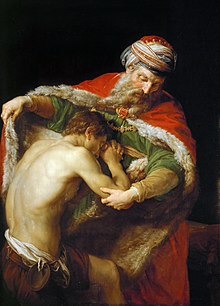
Back مثل الابن الضال Arabic ابن ضال ARZ Прытча аб блудным сыне Byelorussian Paràbola del fill pròdig Catalan Podobenství o marnotratném synu Czech Dameg y Mab Afradlon Welsh Den fortabte søn Danish Verlorener Sohn German Παραβολή του Ασώτου Υιού Greek Parabolo de la erarinta filo Esperanto

The Parable of the Prodigal Son (also known as the parable of the Two Brothers, Lost Son, Loving Father, or of the Forgiving Father)[1][2] is one of the parables of Jesus in the Bible, appearing in Luke 15:11–32.[i] In Luke 15, Jesus is said to tell this story, along with those of a man with 100 sheep and a woman with ten coins, to a group of Pharisees and religious leaders who kept on criticizing him for welcoming and eating with marginalized Jews including tax collectors and other sinners.
The Prodigal Son is the third and final parable of a cycle on redemption, following the parables of the Lost Sheep and the Lost Coin. In Revised Common Lectionary and Roman Rite Catholic Lectionary, this parable is read on the fourth Sunday of Lent (in Year C);[3] in the latter it is also included in the long form of the Gospel on the 24th Sunday of Ordinary Time in Year C, along with the preceding two parables of the cycle.[4] In the Eastern Orthodox Church it is read on the Sunday of the Prodigal Son.
- ^ "The Parable of the Lost Son." Holy Bible (New International Version). – via BibleGateway, Biblica, Inc. 2011 [1973].
- ^ "Parable of the Forgiving Father (15:11-32)." Holy Bible (IVP New Testament Commentaries). – via BibleGateway. 2016.
- ^ "Lent 4C". TextWeek.com. Retrieved 2013-09-12.
- ^ "Proper 19 (24th Sunday of Ordinary Time)". TextWeek.com. Retrieved 2016-09-11.
Cite error: There are <ref group=lower-roman> tags or {{efn-lr}} templates on this page, but the references will not show without a {{reflist|group=lower-roman}} template or {{notelist-lr}} template (see the help page).
© MMXXIII Rich X Search. We shall prevail. All rights reserved. Rich X Search